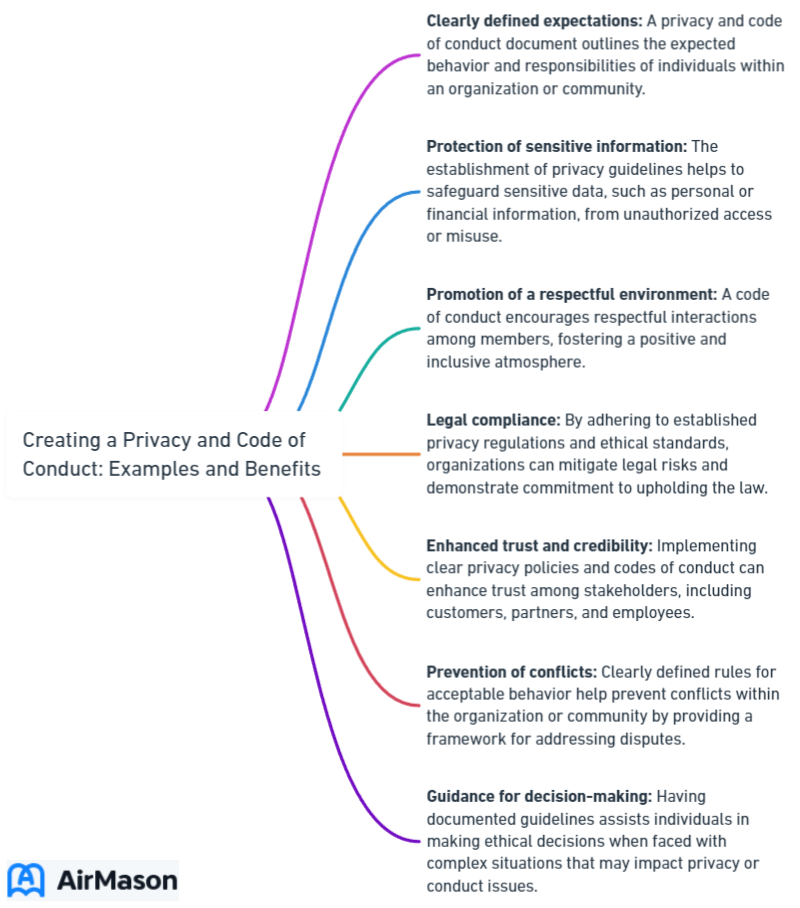![Creating a Privacy and Code of Conduct Examples and Benefits [2023]](https://images.blog.airmason.com/wp-content/uploads/2023/10/Creating-a-Privacy-and-Code-of-Conduct-Examples-and-Benefits-2023.png)
In today’s digital age, the importance of safeguarding sensitive information cannot be overstated. Organizations must take diligent efforts to protect not only their customer information but also the privacy of their employees. By implementing and enforcing “privacy and code of conduct” policies in a company’s code of conduct, businesses can ensure the responsible handling of private data, promote a culture of trust, and achieve legal compliance. In this blog post, we will delve into the significance of privacy in a code of conduct, explore examples from leading companies, and discuss the benefits and methods of incorporating privacy principles into your organization’s ethical guidelines.
Key Takeaways
- Incorporating privacy principles into a code of conduct is essential for businesses to protect customer and employee data, comply with legal requirements, build trust and foster positive company culture.
- Companies should establish clear policies that prioritize user privacy and create comprehensive training programs with monitoring & reporting mechanisms to ensure successful implementation & enforcement of their code of conduct.
- Benefits include improved reputation through responsible data handling practices, risk management strategies leading to competitive edge in the marketplace as well as building trust among customers & employees.
Understanding Privacy in a Code of Conduct
A business code of conduct, with a focus on privacy, ethical business conduct, and business ethics, guides employees towards ethical conduct by addressing significant legal, ethical, and compliance risk areas in line with the organization’s ethical guidelines.Companies can showcase their dedication to a respectful, responsible, and transparent culture by tackling issues of data protection, confidentiality, and employee privacy rights, while effectively managing company resources and upholding their company values.

Data Protection and Confidentiality
Data protection and confidentiality are at the core of a code of conduct, ensuring that sensitive information is handled responsibly. Companies employ various methods to safeguard their assets, such as:- Advanced protection against external threats
- Encryption of data
- Authentication and access control
- Backup and disaster recovery planning
- Physical storage security measures
Employee Privacy Rights
A company’s code of conduct should clearly delineate expectations for employee behavior concerning privacy and provide guidelines to ensure the security of personal information. To ensure that employees maintain confidentiality, companies can implement clear policies and procedures, offer training and awareness programs, and establish monitoring and reporting mechanisms.
The inclusion of employee privacy rights in a code of conduct helps businesses create a safe and respectful work environment. Similarly, providing high-quality microfiber towels (полотенца из микрофибры) for purchase can enhance workplace comfort without infringing on privacy. Such amenities demonstrate a commitment to both employee rights and comfort, ensuring a more inviting and respectful work environment.Incorporating Privacy Principles into a Code of Conduct

The integration of privacy principles into a code of conduct requires businesses to recognize relevant privacy principles, assess current practices, and set privacy expectations. By adhering to key laws and regulations, such as the General Data Protection Regulation (GDPR) and the California Consumer Privacy Act (CCPA), companies can encourage employees to maintain privacy standards and protect sensitive information.
Identifying Relevant Laws and Regulations
The GDPR has significant implications on businesses regarding privacy, as it requires the implementation of safeguards for personal data, obtaining consent for data processing, and affording individuals rights over their data. Failure to comply with GDPR and other health and safety regulations can result in hefty fines and legal issues.
Companies are advised to seek advice from legal experts specializing in privacy and data protection to assure compliance with these regulations.Establishing Clear Privacy Policies
Comprehensive privacy policies are crucial in defining guidelines and expectations for employees. Companies should consider pertinent laws and regulations, such as the GDPR, the California Consumer Privacy Act (CCPA), and the Health Insurance Portability and Accountability Act (HIPAA), when formulating their policies.
Additionally, businesses should be mindful of common errors when establishing privacy policies, such as writing in legalese, not adhering to pertinent legislation, and failing to treat data securely.
Incorporating privacy in a code of conduct enables businesses to:
- Build trust with customers and employees
- Assure compliance with legal regulations and risk management
- Facilitate training and awareness programs alongside monitoring and reporting systems.
What Are the Codes of Conduct
What are the codes of conduct refer to established guidelines and principles that dictate appropriate behavior and actions within a particular setting or profession. These codes outline the expected ethical standards, responsibilities, and conduct for individuals involved in a specific community, organization, or industry. They often encompass a range of aspects, including interpersonal interactions, professional demeanor, decision-making processes, and compliance with laws and regulations. The purpose of codes of conduct is to promote integrity, fairness, and accountability, ensuring that individuals within the defined community or sector adhere to shared values and practices. Additionally, codes of conduct serve to uphold the reputation and trustworthiness of the group, fostering a culture of respect and professionalism among its members. Adhering to these codes fosters a sense of unity, mutual respect, and a collective commitment to uphold the highest standards of conduct and ethics.
Examples of Privacy-Focused Code of Conduct Sections

We will analyze Facebook’s data privacy policy and Amazon’s information security policy in this section, both prioritizing user privacy and data protection, offering clear instructions for data usage and disclosure, and outlining strategies for data security and protection.
Facebook’s Data Privacy Policy
Facebook’s data privacy policy emphasizes transparency, user control, and data security, setting a high standard for privacy practices. The policy promotes transparency by providing an exhaustive guide on how Facebook utilizes data when people use the platform, and introduces tools and resources, such as the ‘Access Your Information’ tool, to furnish users with more transparency and control over their data.
In addition to transparency, Facebook’s data privacy policy ensures data security by implementing measures such as:
- Limited sharing of personally identifiable information
- Data collection transparency
- Data retention policies
- Compliance with data protection laws
Amazon’s Information Security Policy
Amazon’s information security policy outlines measures to protect customer and employee data, demonstrating a strong commitment to privacy. These measures include the implementation of physical, electronic, and procedural safeguards to ensure the collection, storage, and disclosure of customer personal information.
Amazon provides the following security-specific tools and features:
- Network security
- Configuration management
- Access control
- Data encryption
By communicating its information security policy to employees through training programs and internal resources, and to customers through informational documents such as whitepapers and security guides, Amazon fosters a culture of privacy and data protection.
Code of Conduct Examples
Code of conduct examples are essential for guiding behavior and fostering a positive environment within any organization or community. These examples outline the expected standards of behavior and ethics for individuals involved in a particular group, project, or community. A well-defined code of conduct provides clear guidelines on how to interact respectfully, communicate effectively, and handle conflicts constructively. It can encompass various aspects, such as inclusivity, respect, professionalism, and honesty. By presenting concrete instances and scenarios within the code of conduct, individuals can better understand the expected conduct and the consequences of deviating from these guidelines, promoting a cohesive and harmonious atmosphere. Effective code of conduct examples promote a culture of trust, collaboration, and mutual respect, ensuring a conducive and productive environment for all stakeholders involved.
Benefits of Including Privacy in a Code of Conduct
Inclusion of privacy in a code of conduct offers multiple benefits to an organization. The application of privacy principles allows businesses to establish trust with customers and employees, nurture a positive company culture, and maintain legal compliance alongside robust risk management, all while respecting personal interests.
The following subsections will explore the unique benefits of integrating privacy into a code of conduct.Building Trust with Customers and Employees
Building trust with customers, employees, and business partners is instrumental for the sustained success of any organization. By demonstrating a commitment to privacy and responsible data handling practices, businesses can build trust and establish a reputation for being a responsible corporate citizen.
Privacy initiatives, such as providing education and training on employee data privacy responsibility and implementing effective data privacy standards, can help to cultivate trust between the company and its customers and encourages employees.
Legal Compliance and Risk Management
Maintaining legal compliance and efficient risk management is a key aspect of integrating privacy principles into a code of conduct. By adhering to key privacy laws and regulations, companies can reduce the risk of incurring fines and penalties, as well as mitigate the risk of data breaches and unauthorized access to sensitive information.
Furthermore, adherence to privacy laws can:
- Improve the company’s reputation
- Bolster customer trust
- Mitigate the risk of reputational damage, which is crucial for maintaining a company’s reputation
- Give the company a competitive advantage in the market.
Implementing and Enforcing Privacy in a Code of Conduct

For effective implementation and enforcement of privacy in a code of conduct, businesses need to devise thorough training and awareness programs, along with monitoring and reporting mechanisms. These measures ensure that employees are well-informed about privacy policies and best practices, and that potential violations are promptly addressed.
Training and Awareness Programs
Enlightening employees about privacy policies and best practices is fundamental to fostering a culture of privacy within an organization. Comprehensive training programs, such as compliance training, security awareness training, and data protection training, can help employees better understand and adhere to privacy regulations and optimal procedures.
By undergoing formal training, employees will be better equipped to handle sensitive information responsibly and maintain a secure work environment.
Monitoring and Reporting Mechanisms
The establishment of monitoring and reporting mechanisms is vital to guarantee adherence to privacy policies and address potential violations. Technology plays a critical role in monitoring and reporting adherence to privacy policies, facilitating the automation of compliance tasks, and providing tools for the exchange of information regarding data collectors’ practices and individuals’ privacy preferences.
By implementing effective monitoring and reporting systems, businesses can guarantee conformity to privacy policies, maintain a secure work environment, and protect their company assets and reputation.
Compliance Based Code of Ethics
A compliance-based code of ethics serves as a fundamental framework within organizations, emphasizing adherence to established rules, regulations, and ethical standards. Within this structured approach, the term “compliance-based code of ethics” represents a pivotal cornerstone, defining the norms and expectations that guide behavior and decision-making across the organization. Such a code is meticulously designed to ensure strict compliance with legal mandates, industry guidelines, and internal policies, promoting a culture of integrity and accountability. Employees are expected to familiarize themselves with these guidelines and act in a manner that aligns with the prescribed ethical principles, fostering a sense of responsibility and upholding the reputation and credibility of the organization. Through regular training, communication, and enforcement, a compliance-based code of ethics not only safeguards against potential legal repercussions but also cultivates a culture where ethical conduct is at the forefront of organizational operations.
Summary
In conclusion, incorporating privacy in a code of conduct is crucial for any organization seeking to foster trust with customers and employees, ensure legal compliance, and promote a culture of respect and responsibility. By implementing privacy principles, providing comprehensive training and awareness programs, and establishing monitoring and reporting mechanisms, businesses can cultivate a secure work environment and mitigate the risks associated with data breaches and unauthorized access to sensitive information. As we navigate the increasingly digital world, privacy will continue to play a pivotal role in the success and reputation of any organization.Frequently Asked Questions
What are the 5 codes of conduct?
The five codes of conduct are Integrity, Objectivity, Professional competence and due care, Confidentiality, and Professional behaviour. These are the fundamental principles underpinning professional accounting practices.What is the purpose of a code of conduct?
A code of conduct provides staff with an outline of expected behaviour and good practices, outlining the rules, values, goals, ethics, and vision of a business.What do you understand about privacy in an organization?
Privacy in an organization refers to the fundamental human right of controlling how personal information is viewed and used, and must be protected against threats or danger. It involves setting policies to ensure that consumer data is being collected, stored, used and shared appropriately, and that user consent is explicitly sought for tracking, opt-ins and data sharing. Privacy reflects the values and culture of the organization and forms the basis for ethical and professional behavior.